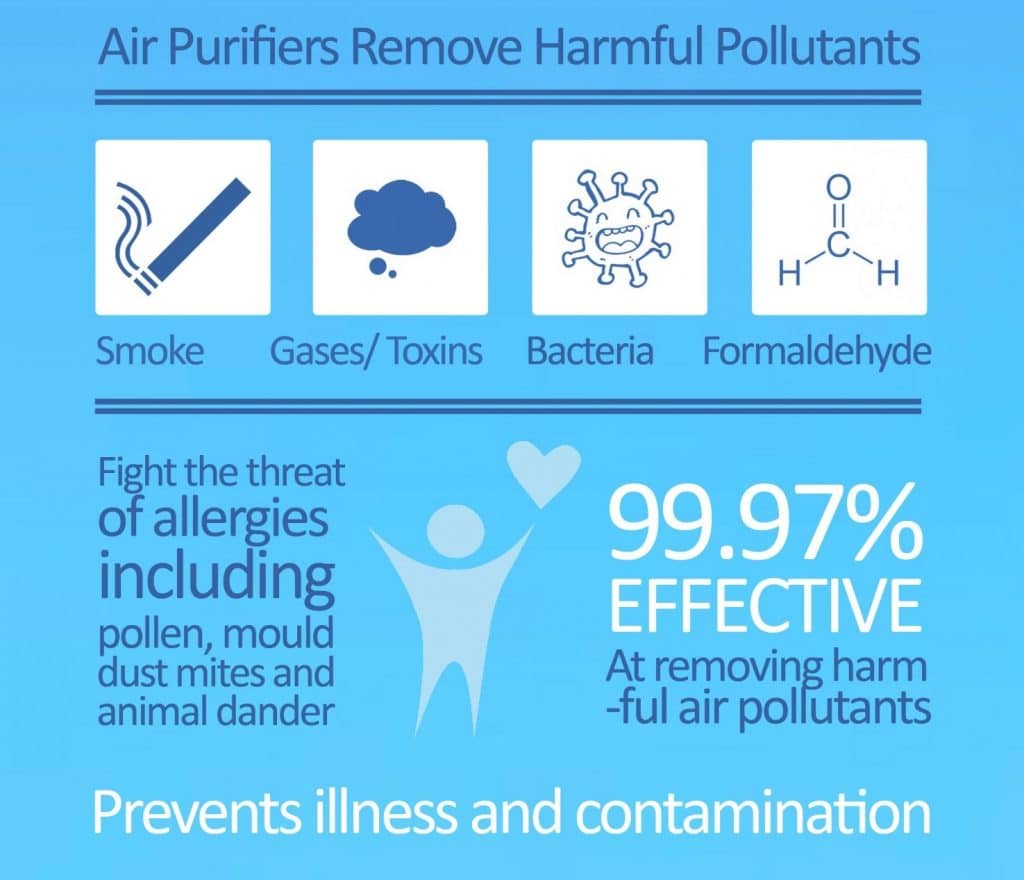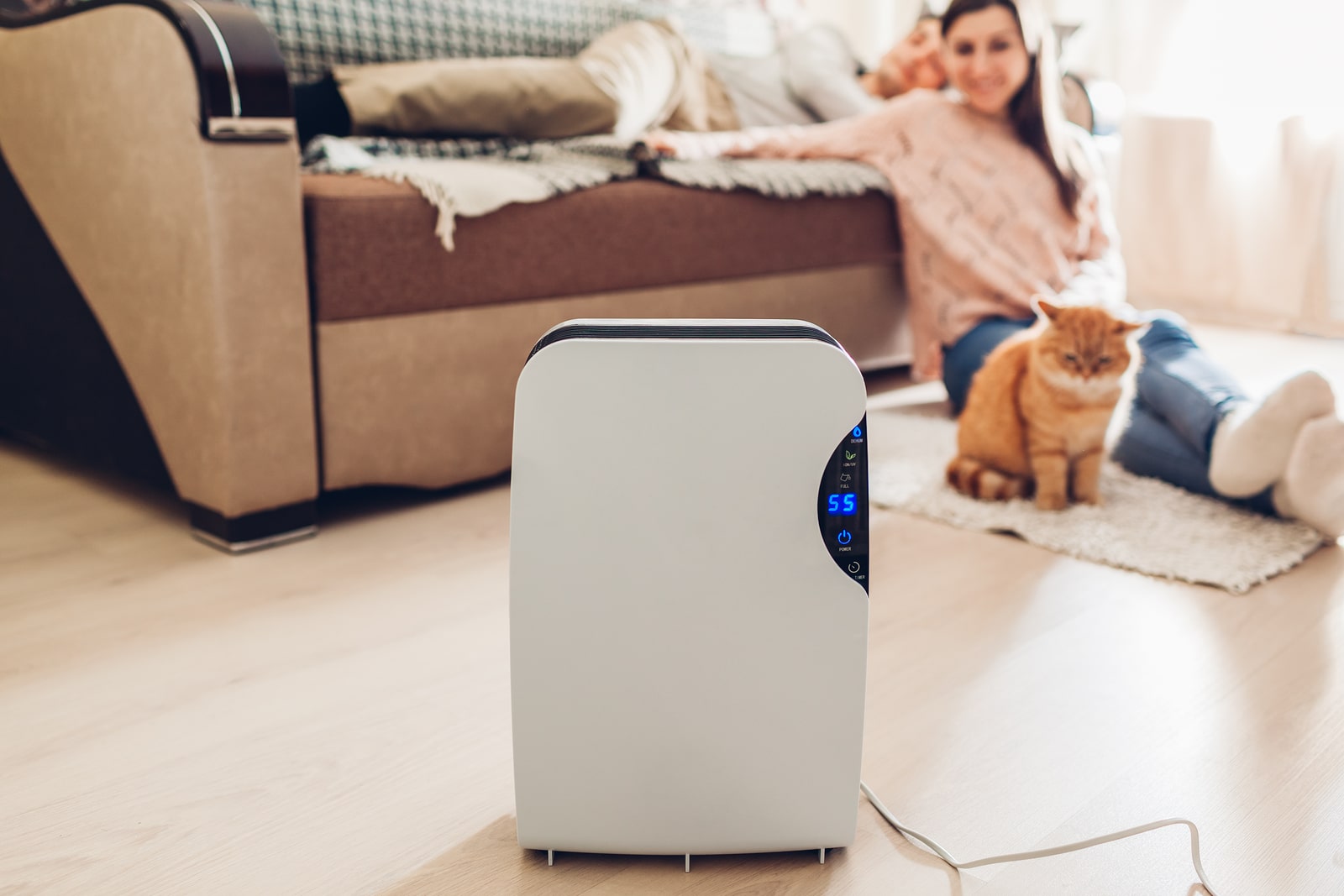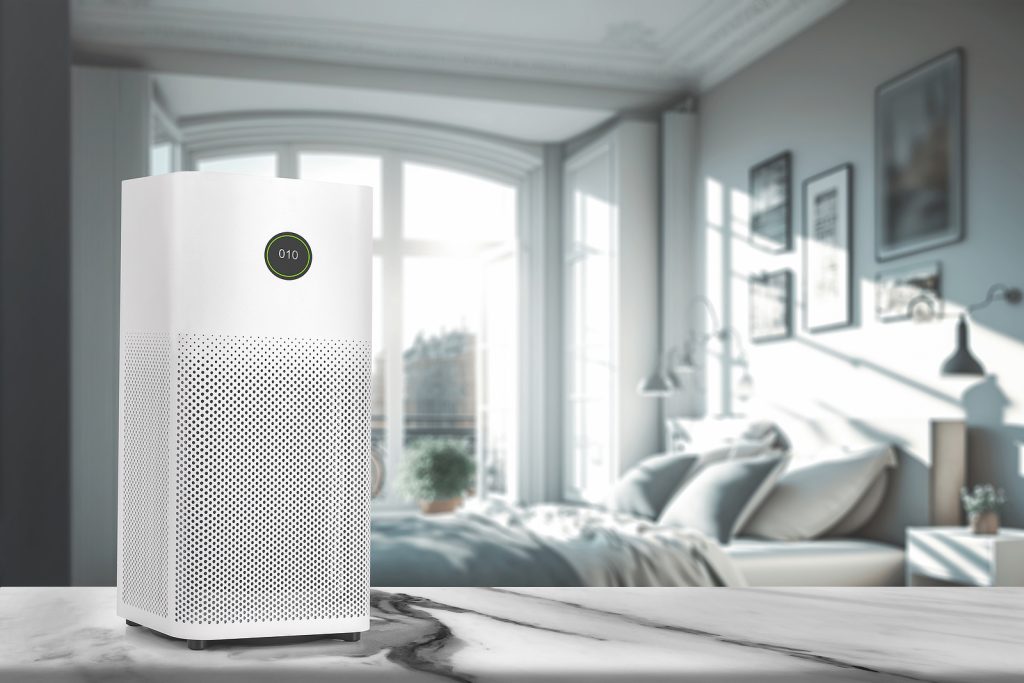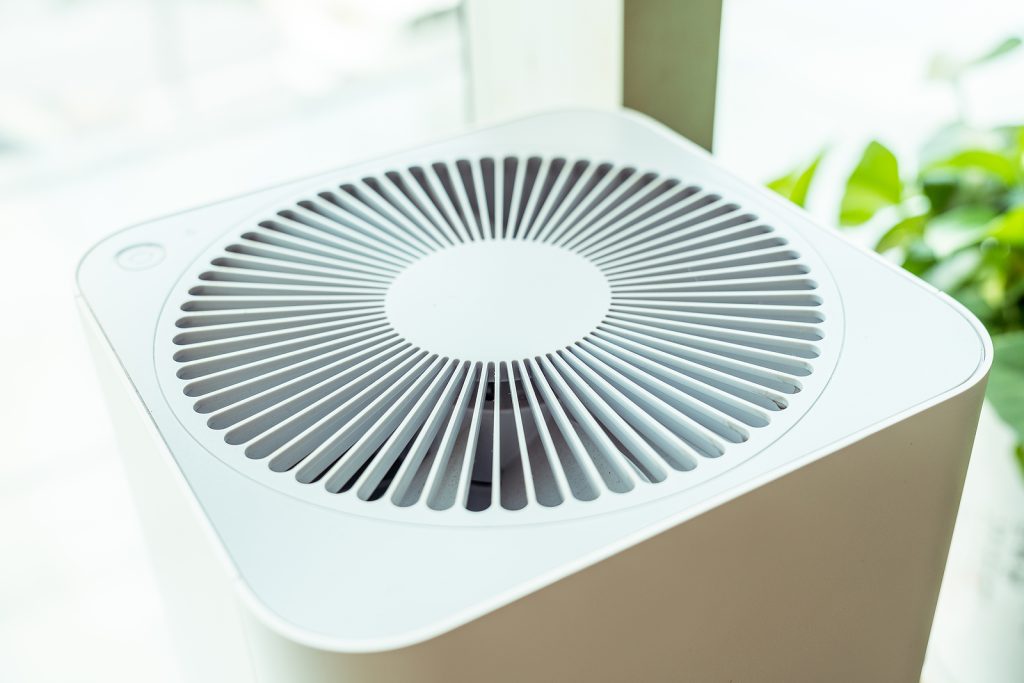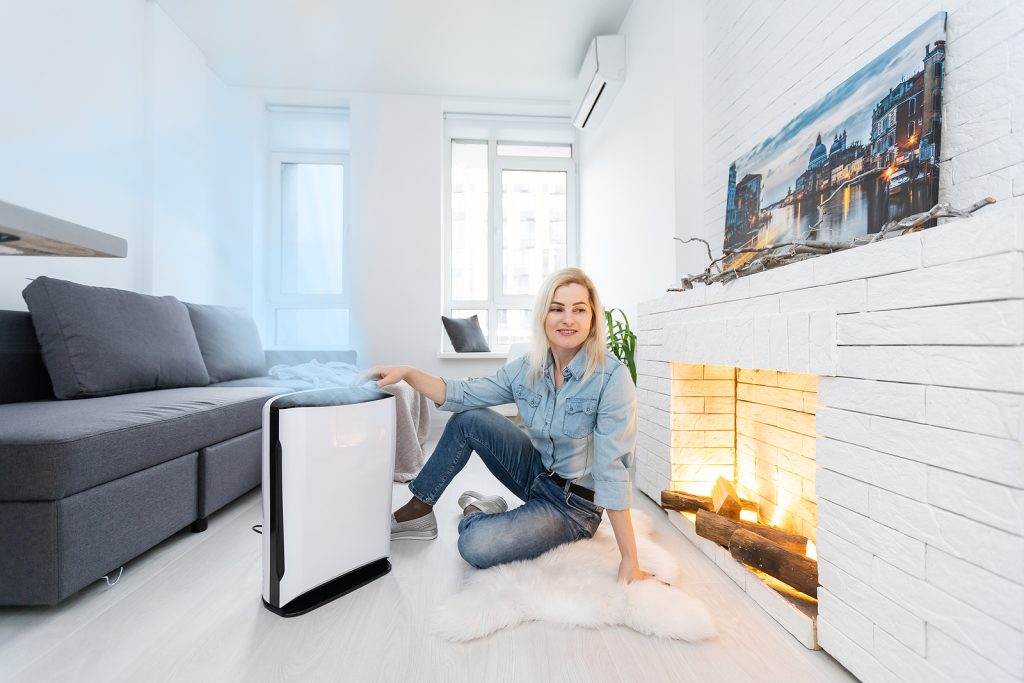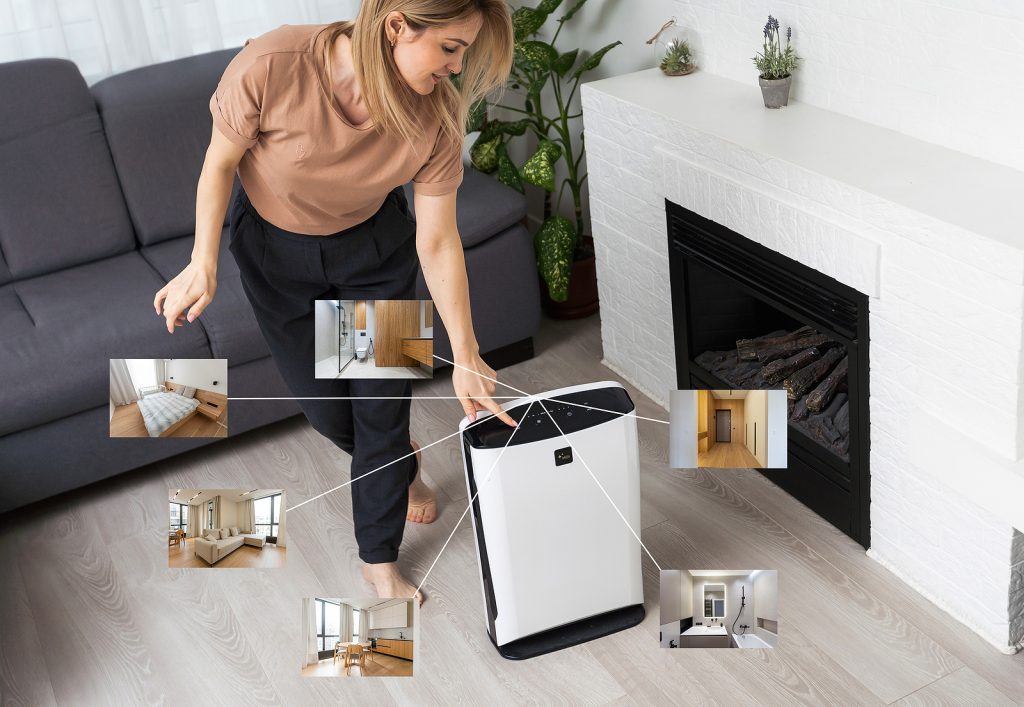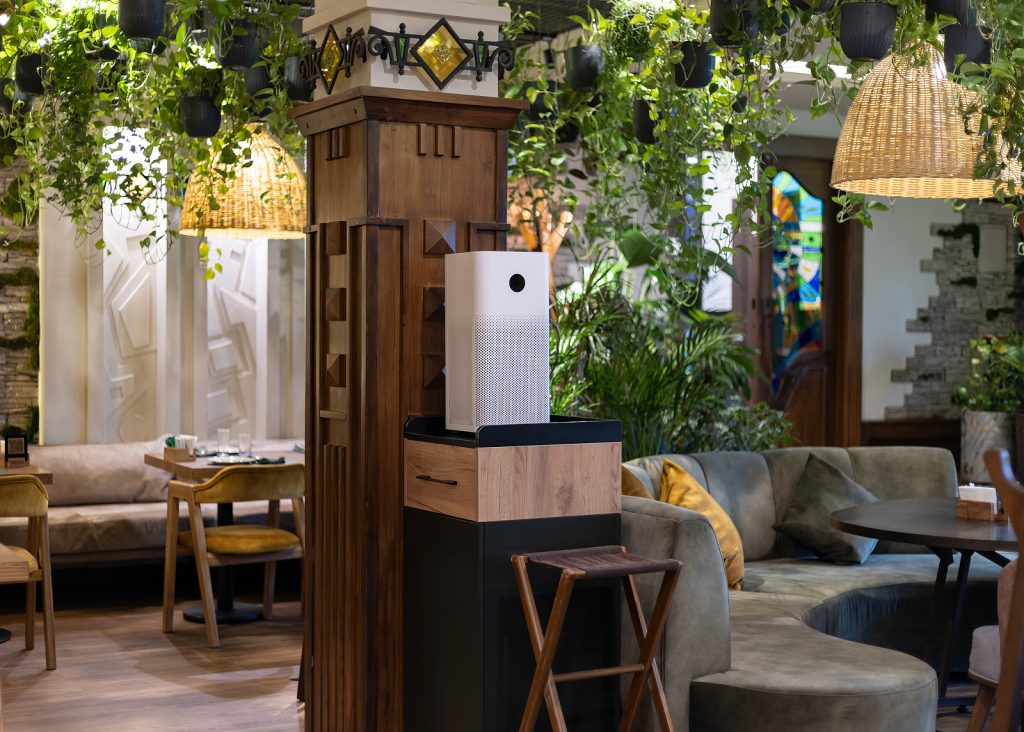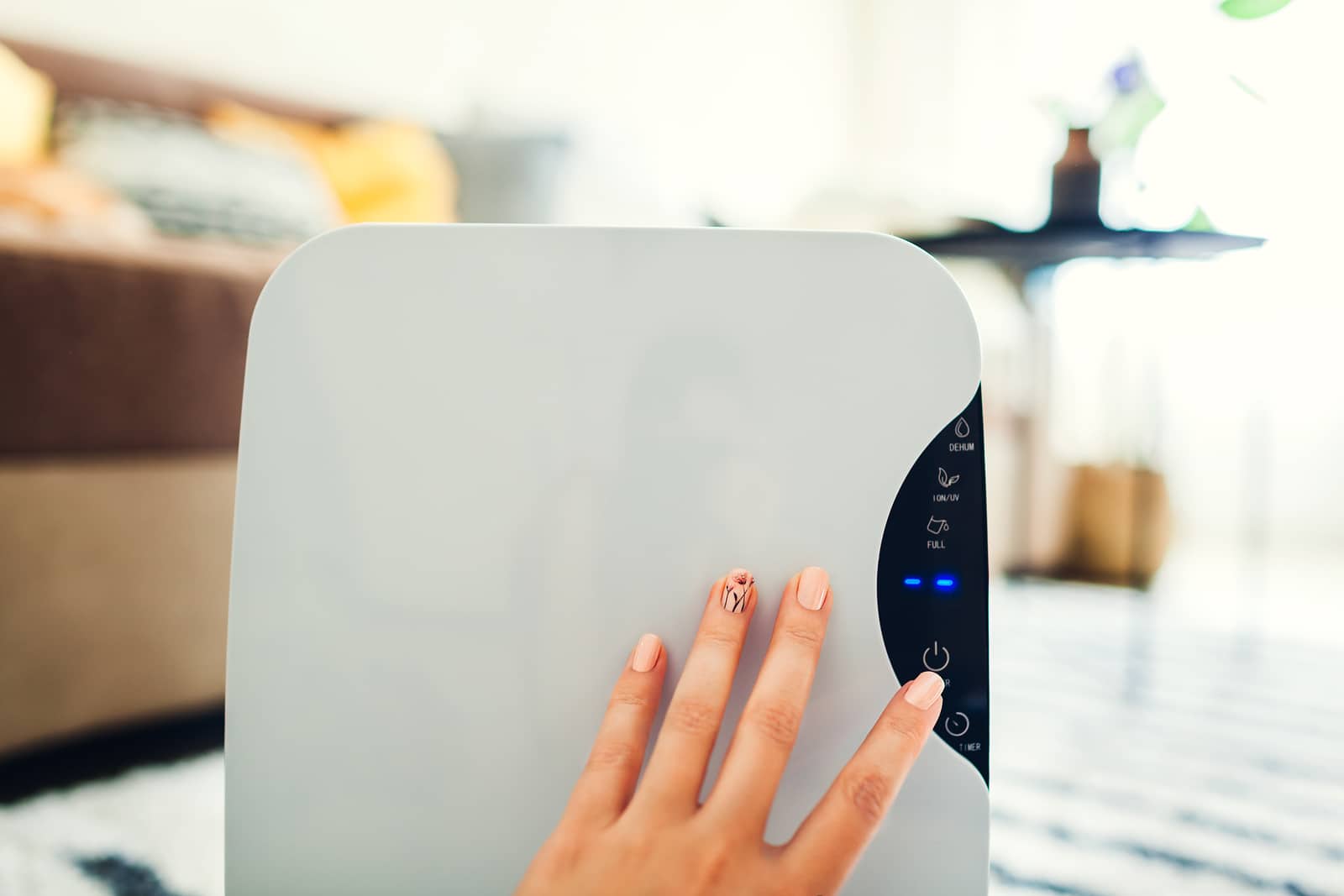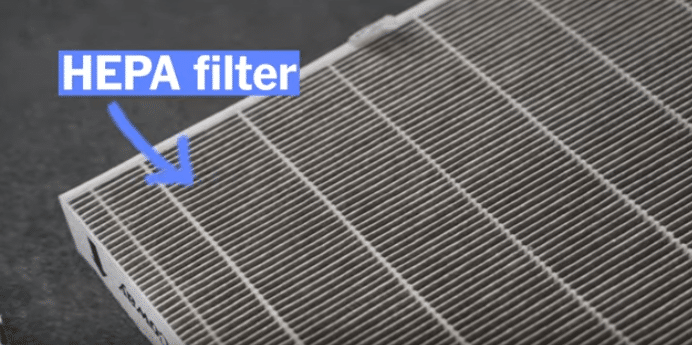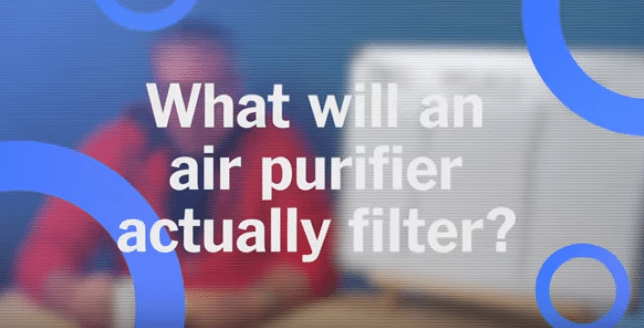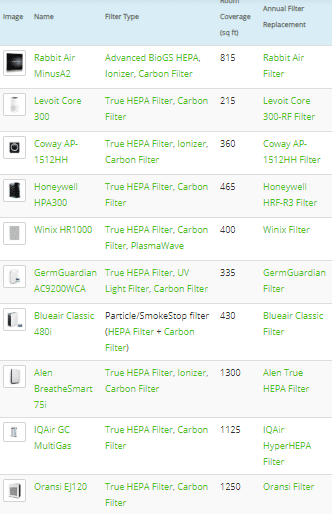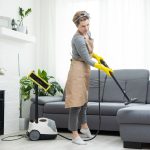Best Air Purifier: Top Picks for Clean Air in Your Home
Air pollution is a growing concern for many people, especially those living in urban areas. Poor air quality can have negative effects on health and well-being, leading to respiratory issues, allergies, and other health problems. One way to combat air pollution is by using an air purifier.
Air purifiers are devices that remove pollutants and contaminants from the air, improving indoor air quality. They work by filtering the air and trapping particles such as dust, pollen, and smoke. Some air purifiers also have additional features such as ionizers or UV-C lights that can further improve air quality by killing bacteria and viruses.
When shopping for an air purifier, there are several things to consider. The type of filter used is an important factor, as different filters are designed to capture different types of particles. Additionally, the size of the room where the air purifier will be used should be taken into account, as different models are designed for different room sizes. Other features to consider include noise level, energy efficiency, and ease of use.
Key Takeaways
- Air purifiers can improve indoor air quality by removing pollutants and contaminants from the air.
- When shopping for an air purifier, consider factors such as the type of filter, room size, and additional features.
- Choosing the right air purifier can help improve respiratory health and overall well-being.
Understanding Air Purifiers
Air purifiers are devices designed to remove contaminants from the air. They are commonly used to improve indoor air quality, especially in homes and offices. Air purifiers work by pulling air through a filter or series of filters, which trap pollutants and particles before releasing clean air back into the room.
Air purifiers can be particularly useful for people with allergies or respiratory issues, as they can help to reduce the amount of airborne allergens and irritants. They can also be beneficial for those living in areas with high levels of air pollution.
When shopping for an air purifier, it’s important to consider the size of the room it will be used in, as well as the type of filter it uses. Some filters are designed to remove specific types of pollutants, such as pollen or smoke, while others are more versatile and can trap a wide range of contaminants.
It’s also worth noting that air purifiers can vary in terms of their noise level, energy efficiency, and maintenance requirements. Some models may require frequent filter changes or cleaning, while others may have longer-lasting filters that are easier to maintain.
To determine whether an air purifier is working effectively, it’s helpful to monitor indoor air quality using an air quality monitor or indicator light. These devices can provide real-time information about the levels of pollutants in the air, allowing users to adjust their air purifier settings as needed.
Overall, air purifiers can be a valuable tool for improving indoor air quality and reducing the impact of air pollution on health. By understanding the different types of air purifiers available and their features, consumers can make informed decisions when choosing the best air purifier for their needs.
Why You Need an Air Purifier
Air pollution is a major problem in many areas around the world, and it can have serious consequences for your health. Air purifiers are an effective way to remove harmful particles from the air, and they can provide a range of benefits for your home and your health.
Air purifiers are particularly useful for removing dust, particulate matter, smoke, pollen, and other allergens from the air. These particles can cause a range of health problems, including allergies, asthma, and other respiratory issues. Air purifiers can also help to remove viruses and bacteria from the air, which can help to prevent the spread of illness.
In addition to removing harmful particles from the air, air purifiers can also help to reduce unpleasant odors in your home. This can be particularly useful if you have pets or if you live in an area with high levels of pollution.
Air purifiers come in a range of sizes and styles, so it’s easy to find one that will suit your needs. Some air purifiers are designed to be portable, so you can move them from room to room, while others are designed to be installed in a specific location.
Overall, air purifiers are an effective way to improve the air quality in your home and protect your health. Whether you’re looking to reduce allergies and asthma symptoms, remove unpleasant odors, or simply breathe easier, an air purifier can help you achieve your goals.
Types of Filters
Air purifiers use different types of filters to remove pollutants from the air. Here are some common types of filters:
Pre-filter
A pre-filter is the first line of defense in an air purifier. It captures large particles such as hair, dust, and pet dander. Pre-filters are usually washable and reusable.
HEPA Filter
HEPA stands for High-Efficiency Particulate Air. A HEPA filter is designed to capture particles as small as 0.3 microns. True HEPA filters are the most effective at removing airborne particles, including pollen, mold spores, and bacteria. Replacement filters for HEPA air purifiers can be expensive.
Activated Carbon Filter
Activated carbon filters are effective at removing odors and chemicals from the air. They work by adsorbing (not absorbing) particles onto the surface of the filter. Activated carbon filters are not effective at removing particles such as dust and pollen.
Air purifiers can use multiple filters to remove different types of pollutants from the air. For example, some air purifiers have a pre-filter, a HEPA filter, and an activated carbon filter. It’s important to replace filters regularly to maintain the air purifier’s effectiveness.
Key Features to Look for in an Air Purifier
When shopping for an air purifier, it’s important to consider a few key features to ensure you get the most effective and efficient device for your needs. Here are some of the most important features to look for:
CADR Rating
The Clean Air Delivery Rate (CADR) is a measure of how much clean air an air purifier can deliver per minute. Look for an air purifier with a high CADR rating, as this indicates it can effectively remove pollutants from the air.
Room Size
Consider the size of the room you plan to use the air purifier in, as this will determine the appropriate size and strength of the device. Make sure to choose an air purifier that is designed for the size of your room.
Micron Rating
The micron rating refers to the size of the particles an air purifier can filter out of the air. Look for an air purifier with a micron rating of 0.3 or smaller, as this will capture the smallest particles, including allergens and pollutants.
Speed Settings
Make sure the air purifier you choose has multiple speed settings. This will allow you to adjust the device’s performance based on the level of air pollution in your home.
Noise Level
Consider the decibel level of the air purifier, especially if you plan to use it in a bedroom or other quiet space. Look for a device with a noise level of 60 decibels or lower.
Indicator Light
An indicator light can be helpful in letting you know when it’s time to change the air filter. Look for an air purifier with an indicator light that clearly shows when the filter needs to be replaced.
Smart Features
Some air purifiers come with smart features, such as Wi-Fi connectivity and app control. These features can be useful for monitoring and controlling the device from your smartphone or other smart devices.
User-Friendly Design
Look for an air purifier with a user-friendly design, including easy-to-use controls and an intuitive interface. This will make it easier to operate and maintain the device over time.
By considering these key features, you can choose an air purifier that is both effective and efficient in improving the air quality in your home.
Review of Top Air Purifier Brands
When it comes to air purifiers, there are several well-known brands that offer quality products. In this section, we will review some of the top air purifier brands available in the market.
Coway
Coway is a popular brand that offers a range of air purifiers. The Coway Airmega 250 is a high-performance air purifier that can cover up to 930 square feet. It features a three-stage filtration system that includes a pre-filter, activated carbon filter, and True HEPA filter. The Coway Airmega 250 also has a smart mode that automatically adjusts the fan speed based on the air quality.
Blueair
Blueair is another brand that is well-known for its air purifiers. The Blueair Blue Pure 211+ is a popular air purifier that features a three-stage filtration system. It has a pre-filter, activated carbon filter, and True HEPA filter that can capture 99.97% of airborne particles. The Blueair Blue Pure 211+ also has a washable pre-filter that can be reused.
Levoit Core 300
The Levoit Core 300 is a compact air purifier that is perfect for small rooms. It features a three-stage filtration system that includes a pre-filter, True HEPA filter, and activated carbon filter. The Levoit Core 300 is also energy efficient and has a low noise level.
Dyson Purifier Humidify+Cool Formaldehyde
The Dyson Purifier Humidify+Cool Formaldehyde is a high-end air purifier that features a four-stage filtration system. It has a HEPA filter, activated carbon filter, and a formaldehyde filter. The Dyson Purifier Humidify+Cool Formaldehyde also has a built-in humidifier and can be controlled using a mobile app.
Levoit Core 300s
The Levoit Core 300s is an upgraded version of the Levoit Core 300. It features a three-stage filtration system that includes a pre-filter, True HEPA filter, and activated carbon filter. The Levoit Core 300s also has a smart mode that can adjust the fan speed based on the air quality.
Winix 5500-2
The Winix 5500-2 is a popular air purifier that features a three-stage filtration system. It has a pre-filter, True HEPA filter, and activated carbon filter. The Winix 5500-2 also has a smart mode that can adjust the fan speed based on the air quality.
Overall, these top air purifier brands offer quality products with different features and price ranges. It is important to consider the room size, filtration system, and additional features when choosing an air purifier.
Air Purifiers for Specific Needs
Air purifiers can be a lifesaver for people with specific needs. Whether it’s allergies, pets, or odors, there is an air purifier that can help. Here are some specific needs and the air purifiers that can address them:
Allergies
For people with allergies, air purifiers with HEPA filters are the best option. These filters can capture small particles such as pollen, dust mites, and pet dander. Some air purifiers also come with activated carbon filters that can remove odors and volatile organic compounds (VOCs) that can trigger allergies.
Pets
Pet owners need air purifiers that can capture pet dander and hair. Air purifiers with HEPA filters and activated carbon filters are ideal for pet owners. Some air purifiers also come with ionizers that can remove pet odors.
Odors
Air purifiers with activated carbon filters are the best option for removing odors. These filters can remove smoke, cooking odors, and other unpleasant smells. Some air purifiers also come with pre-filters that can capture larger particles such as pet hair and dust.
Small Rooms
For small rooms, air purifiers with a CADR (Clean Air Delivery Rate) of 100-150 are ideal. These air purifiers can clean the air in a small room quickly and efficiently.
Wildfire Season
During wildfire season, air purifiers with HEPA filters and activated carbon filters are the best option. These filters can capture small particles and remove smoke and other pollutants from the air.
Engineers
Air purifiers with PECO (Photo Electrochemical Oxidation) technology are ideal for engineers. PECO technology can remove volatile organic compounds (VOCs) and other pollutants that can be harmful to the environment.
Filter Replacements
When buying an air purifier, it’s important to consider the cost of filter replacements. Some air purifiers require frequent filter replacements, which can be expensive. Look for air purifiers with washable or reusable filters to save money in the long run.
Noise Level
Some air purifiers can be noisy, which can be distracting in a living room or bedroom. Look for air purifiers with low noise levels, especially if you plan to use them while sleeping.
Overall, air purifiers can be a great investment for people with specific needs. Whether it’s allergies, pets, or odors, there is an air purifier that can help. When choosing an air purifier, consider the specific needs you have and look for a model that can address those needs effectively.
Environmental and Energy Considerations
When it comes to choosing the best air purifier, it’s important to consider the environmental and energy impact of the unit. The Environmental Protection Agency (EPA) recommends choosing an air purifier that is Energy Star certified, as these models are designed to use less energy and produce fewer greenhouse gas emissions than non-certified models.
Energy Star certified air purifiers are tested and verified to meet strict energy efficiency guidelines set by the EPA. These guidelines ensure that the unit uses less energy while still providing effective air cleaning. By choosing an Energy Star certified air purifier, consumers can save money on their energy bills while also reducing their impact on the environment.
In addition to choosing an Energy Star certified air purifier, consumers should also consider the energy use of the unit. Look for models with low energy consumption ratings, which will help to further reduce energy costs and environmental impact.
It’s also important to consider the materials used in the construction of the air purifier. Look for models that are made from eco-friendly materials and that are designed to be easily recyclable at the end of their lifespan.
By considering these environmental and energy factors when choosing an air purifier, consumers can make a more informed decision that not only benefits their health but also the health of the planet.
Conclusion
In conclusion, choosing the best air purifier is essential for maintaining high-quality air in your home or office. After reviewing the top air purifiers on the market, it is clear that there are several excellent options available.
Based on the recommendations of experts and consumer reviews, the top air purifiers include the Coway AP-1512HH Mighty Air Purifier, Winix 5500-2 Air Purifier, and the Blueair Blue Pure 211+ Air Purifier. These air purifiers have proven to be effective in removing pollutants and allergens from the air, resulting in better sleep and overall health.
When considering buying an air purifier, it is important to keep in mind the size of the room, the type of filter, and the particle counter rating. A HEPA filter is recommended for those with allergies or asthma, while an activated carbon filter is ideal for removing odors and chemicals from the air.
In addition to purchasing a high-quality air purifier, there are other steps that can be taken to improve indoor air quality. This includes regularly changing air filters, using natural cleaning products, and maintaining proper ventilation.
Overall, investing in a quality air purifier is a smart decision for anyone looking to improve the air quality in their home or office. With the right research and considerations, finding the perfect air purifier for your needs can be a simple and rewarding process.
Choosing the Best Air Purifier
Deciding what to use to clean your home might not seem like a difficult task on the surface. Nevertheless, ensuring the devices and products you choose are both safe and effective has become a hot topic in recent years, especially now that we know more about how certain compounds and chemicals affect our health.
This is also true when it comes to choosing an air purifier. It can be challenging to find one that effectively cleans the air, fits your lifestyle, falls within your price range and doesn’t look like an outdated radiator. When in doubt, it’s best to turn to tried-and-true brands and products with excellent user reviews. Finds evaluated these eight air purifiers by their efficiency (how many germs they claim to suck up), their appearance (is it aesthetically-pleasing?) and price. From desktop fans to state-of-the-art machines, here are eight of the best and most versatile air purifiers on the market.
Source
What Can an Air Purifier Do?
Wondering what can an air purifier actually do and do they really filter? Air purifiers are not complicated machines: Fundamentally, they’re just a dense filter and a fan that draws air through it. But there’s a fair amount of confusion about what they can remove from the air—and, just as important, what they can’t.
The Best Air Purifiers
Here are the top 10 Best Air Purifiers according to our research
KNOWING YOUR PROBLEMS AND HOW AIR PURIFIER FIX THEM
Source
1, To help with your allergies
Each year, about 2000 people are diagnosed with nasal cavity in the United States. Airborne allergens wreak havoc on the immune system and cause many unpleasant symptoms like eye irritation, coughing, sneezing, painful headaches and more.
True HEPA filter air purifiers are the best one for you. Find the best ones in Best air purifier for allergies List.
2, To reduce asthma
One again, you should aim at True HEPA Filter. If you have problem with ion, stop using your Ionizer filter immediately. Find the best ones in Best air purifier for asthma List.
3, To prevent dust
For better air purifier’s filter life, you should use the one with pre-filter. Air purifier with a HEPA filter will help prevent dust as much as possible. Find the best ones in Best air purifier for dust List.
4, To trap pet hair and dander
All of HEPA air purifiers (especially True HEPA ones) can capture pet hair and dander with no difficulty. Find the best ones in Best air purifier for pets List.
5, To remove smoke and odors
You must look for an Activated Carbon filter (or Charcoal filter) to help remove all the smokes and smells. Find the best ones in Best air purifier for smoke List.
Air Purifier Buying Guide
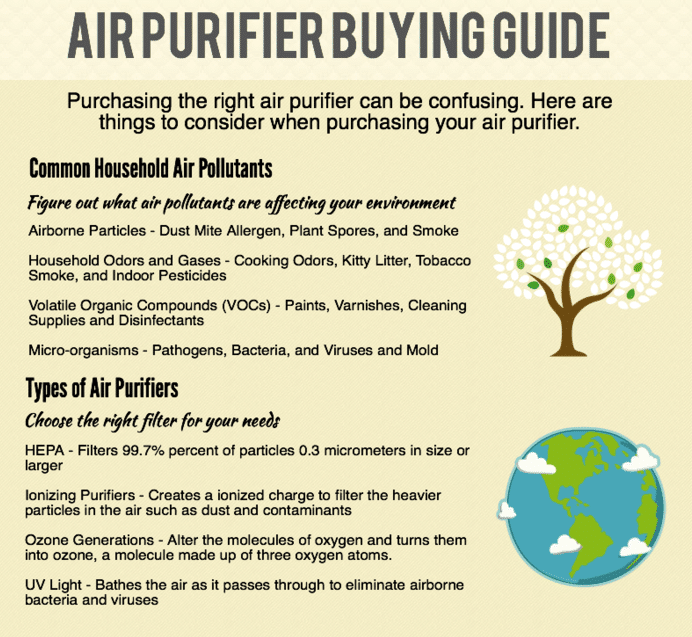
What Air Purifier Does
